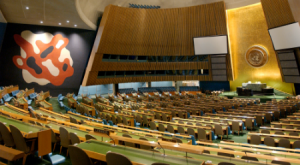The present report, submitted pursuant to General Assembly resolution 73/24, reviews progress towards implementation of the United Nations Action Plan on Sport for Development and Peace, drawing on input received from Member States, the United Nations system, and other stakeholders. Prepared in the context of the global coronavirus disease (COVID-19) pandemic, the report highlights the important role of physical activity and sport in mitigating the impact of the pandemic on health and well-being and examines the role of digital technology in helping sport to fulfill that role. It further examines means of building global resilience to counter future shocks through investment and innovation in sport and sport-related policies.
Download the Report and learn more about the…
 Welcome to the United Nations
Welcome to the United Nations
 The
The